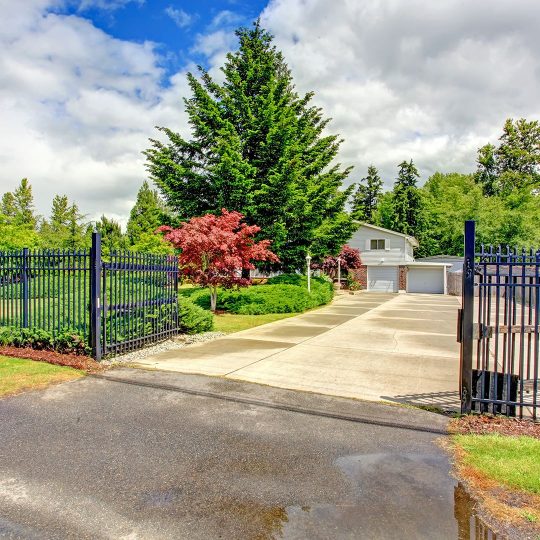Buying a Custom Gate
5 Things You Should Know First

There are many types of gates available for a wide range of purposes. Before you choose a custom gate design, there are five things you should consider:
1. What’s the Purpose of the Custom Gate?
From security to pure aesthetics, your gate should have a purpose. This purpose will help determine the size, position, and materials you’ll need when it comes to design. If security is the main goal, you need a strong and stable gate. You may also want to consider making it automatic and linking it to your home security system. This could allow you to see who’s at the gate before you open it with a touch of a button. If the gate is used for farming and keeping animals wrangled, it needs to be designed so nothing can fly or jump over it. Gates built purely for landscaping or privacy purposes can have more of an artistic design, and don’t necessarily need to be as strong.
Depending on where you live and what purpose the gate holds, you’ll want to find out if there are any zoning or neighborhood rules to follow before building your gate—especially if it requires a fence around it. There are certain laws that limit height and other conditions around adding features to your property line.
2. What Type of Gate is Needed?
Once a gate has a purpose, it will be easier to pick the type of gate you need. Will your gate open automatically or will you have to manually swing or slide it? The gate function will also help determine the right type of gate material. If it’s a heavier material, opening it manually may cause some issues.
On what kind of terrain will your gate be situated? A smooth surface will make it easier for the gate to slide or swing open. Is the area hilly? Prone to flooding? Easily accessible? These factors will all come into play when installing your gate. Also, the size of gate opening will help determine whether a small swing gate or large sliding gate would be more beneficial.
3. Gate Material Options
Now that you know what the gate is for and how it will function, you can pick the right materials to use. Here are just a few ideas:
Tube Gates. It’s strong, durable, and without sharp edges to catch on anyone or anything. The tubes can be lightweight aluminum or heavier steel, and it’s typically used on farms for fenced-in livestock areas.
Wooden Gates. It’s easy enough to build wooden gates from new or reclaimed materials. Whether painted, stained, or natural, there’s a wide variety of woods available. This material requires additional upkeep to prevent rotting or to make repairs.
Metal Gates. Aluminum, steel, iron—all of these materials can create highly functional gates with both artistic design and security in mind. They will need to be maintained properly to prevent rust, and can be costly depending on the grade purchased.
4. Materials for Maintaining Your Gate
To keep your gate at it’s best, it needs to be built right and properly maintained. All gates and operating features can show wear overtime. Whether you need extra batteries for an automatic gate operator, lubrication for the gate hinges, or paint and stain to keep a wooden gate looking new, it’s all something that should be considered before a single post in installed. If your gate is planned out, designed correctly with its purpose in mind, and installed by professionals, it’s less likely any major issues will arise.
5. What’s the Budget?
How much you have to spend will also greatly impact the type and size of gate you design. Take the following costs into consideration:
- Size. The bigger the gate, the more expensive.
- Material. Wood is cheaper than metal.
- Hardware. Hinges, latches, and any gate operating mechanism could cost you more.
- Labor. If you want the job done right, you may want to call in the pros.
- Surprises. Like any construction project, always have a cushion for the unforeseen hiccup.
Now that you’ve considered these five major points of designing and buying a custom gate, call the Security Five specialists at 610-323-9511 with any questions.